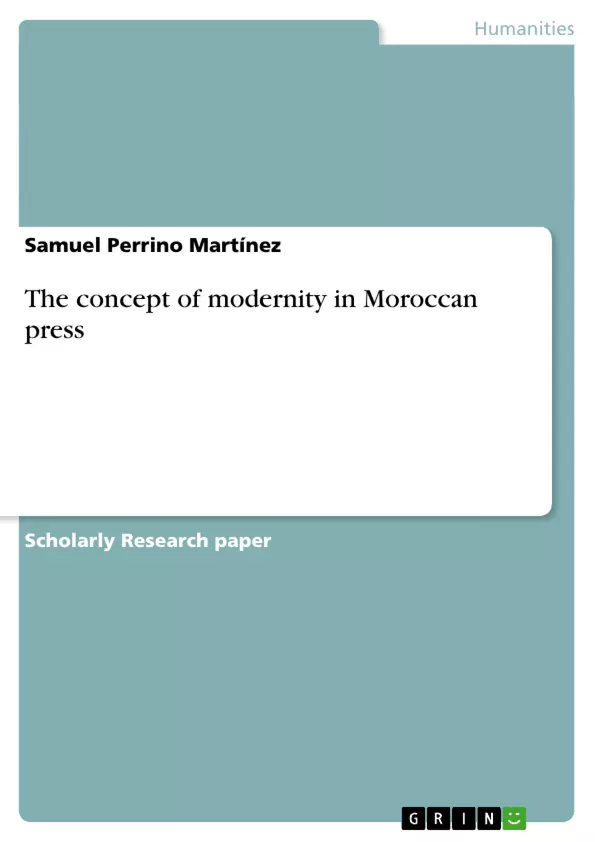The concept of modernity and democracy has taken up many discussions in the Arab World. A constant feature is the debate as to whether or not the Arab or Islamic World is compatible with the idea of modernity, and understanding this idea from a Western perspective, in relation to a set of abstract values such as liberty or democracy.
The aim of this paper is mainly to attempt an analysis of the concept of modernity through the use of the French press in Morocco, concretely three newspapers: the “independents” Maroc-Hebdo, and “ L´economiste” and the “officialist” Le Matin du Sahara et du Magheb,
The press is not just an interesting media due to the value it holds in providing information on world events, but also due to the fact that it reflects the opinions and points of view of the person, or the group behind the writing; therefore providing an interesting mirror of the society. The press has been chosen as a source in order to examine the Islamic or Arab vision of modernity. The discussion about the treatment of the concept “Modernity” in the Moroccan press is addressed through the evaluation of several questions:
The paper will mainly emphasize the concept of modernity; first talking about the general considerations of the concept in an abstract sense, then focusing on the main topics of discussion, and at last evaluating the paper of tradition in the modernizing initiative, distinguishing two different discourses.
This is a work basically descriptive, due to the characteristic of the sources ( primary) which are not opportune for the interpretation. The work will intercalate the text with many quotes, referring to the discussed topic.
This work examines the existence of different perspectives on the same topic, through the treatment of the news and the language used. The paper will analyze different news between the years 2011 and 2012. It is mainly based in primary sources, however some secondary sources were also used as a theoretical framework.
Inhaltsverzeichnis (Table of Contents)
- Introduction
- Context
- Press in Morocco
- Journals
- Representativeness of the sample
- The concept of modern
- Definition
Zielsetzung und Themenschwerpunkte (Objectives and Key Themes)
This research paper explores the concept of modernity within the Moroccan press, specifically examining three French-language newspapers: Maroc-Hebdo, L'economiste, and Le Matin du Sahara et du Magheb. The paper aims to analyze how these publications discuss and interpret modernity, drawing on a sample of articles from 2011 to 2012.
- The relationship between modernity and Islam in Morocco
- The role of the Moroccan press in shaping public discourse on modernity
- The impact of French language and culture on the conception of modernity in Morocco
- The different perspectives on modernity held by different sectors of Moroccan society
- The influence of tradition on the modernization process in Morocco
Zusammenfassung der Kapitel (Chapter Summaries)
The introduction sets the context for the study, exploring the ongoing debate about the compatibility of the Arab/Islamic world with modernity. The paper's objectives are outlined, focusing on an analysis of the concept of modernity through the lens of the Moroccan press. The selection of the French press as a source is explained, emphasizing its role in reflecting the opinions and perspectives of a particular societal segment.
The "Context" section provides an overview of the Moroccan press landscape, highlighting its pluralism and the influence of the monarchy. It discusses the characteristics of the French-language press, including its link to a cultural elite and its focus on politics and social issues. The section further explores the representativeness of the selected newspapers, acknowledging their limited reach but emphasizing their significance as influential voices within the Moroccan elite.
Schlüsselwörter (Keywords)
This research paper focuses on key concepts such as modernity, Islam, tradition, Moroccan press, French language, cultural elite, and political discourse in the context of the Arab world. The study utilizes primary sources from selected Moroccan newspapers, examining their perspectives on the relationship between modernity and Islamic identity.
Frequently Asked Questions
What is the main focus of this research paper?
The paper analyzes the concept of modernity and democracy within the Moroccan French-language press between 2011 and 2012.
Which newspapers were analyzed in the study?
The study focused on three publications: "Maroc-Hebdo", "L'economiste", and "Le Matin du Sahara et du Magheb".
Is Islam compatible with modernity according to the paper?
The paper examines the ongoing debate in the Arab world regarding the compatibility of Islamic values with Western concepts of liberty and democracy.
What role does the French press play in Morocco?
The French-language press reflects the views of the cultural and political elite, serving as a mirror for specific segments of Moroccan society.
How does tradition influence modernization in Morocco?
The research distinguishes between different discourses on how tradition acts as either a barrier or a foundation for modernizing initiatives.
- Arbeit zitieren
- Samuel Perrino Martínez (Autor:in), 2012, The concept of modernity in Moroccan press, München, GRIN Verlag, https://www.grin.com/document/202838



